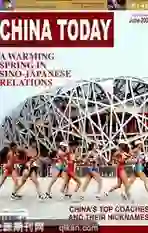A Private Translation Company Contracted for the Beijing Olympics
2008-06-25staffreporterHOURUILI
staff reporter HOU RUILI
AS a former official of Chinas National Development and Reform Commission, Jiang Xiaolin knew everything there was to know about state-owned enterprises and real estate operations. But after a career spent in public service, he decided the time was right to strike out on his own. “We all feel sometimes that we can do a job better ourselves, that we can turn a lawn into a garden on our own,” Jiang said. So in 2005 he seized on the greatest opportunity of his career. He founded his own translation company, the Beijing Yuanpei Century Translation Co., Ltd. In late 2006, the company was named the sole translation and interpretation services supplier for the 2008 Beijing Olympic Games. It is the first time in Olympic history that a private company has been commissioned to provide translation services for the Games.
Earn Clients Trust by
Insisting on Quality
Traditionally, translators in China were employed by publishing companies, and they concentrated almost exclusively on the bookish task of making foreign literary works accessible to the Chinese public. However, since China adopted the policy of opening-up, a pressing need arose for translators and interpreters able to quickly and accurately bridge linguistic divides.
During the first decade of Chinas reforms in the 1980s, competent translators and interpreters were essentially self-employed and in short supply, and it was not until the 1990s that the first actual translation companies began to emerge in China. But even then, the quality of translations was not always assured.

Jiang realized that what was needed was a service that stood by the accuracy of its work. And so, drawing on the linguistic resources of Peking University, he established Yuanpei in 2005, and it has since become the only translation service in China that has implemented a total quality control system.
Indeed, the company has put its money where its mouth is, and it is so sure of its reliability that it will compensate a client for the slightest mistake. “We as a service stand by our work completely. The slightest mistake, and there will be no charge to the client. We believe that is an absolute prerequisite in a translation service if it is to win a clients trust,” he said.
Still, not all translators are equally proficient, and for that reason strict oversight is required to ensure that the companys translators all meet its exacting demands. To do that, Yuanpei uses a systematic approach that begins by standardizing all terminology on a computer. It then coordinates a pool of translators on the basis of that standard lexicon, assigns separate professional editors to correct language and grammar, and finally subjects the end result to an independent expert, who will not hesitate to return the translation to be redone if he finds the slightest inconsistency.
Security, traffic and language services will be the top three challenges faced by the organizers of the Beijing Olympics. In all previous Games, translators were provided by government, which often proved to be a troubling source of miscommunication and created problems with coordination. “In our bid for the Olympic contract, our operation so impressed the BOCOG (Beijing Organizing Committee for the Games of the XXIX Olympiad) that it was decided a professional company could provide a far better service than could individual officials or the Games organizers,” Jiang said.
After exchanging views with experts from Australia and Japan, who have experience in Olympic translation, Yuan-pei decided to treat the problem as an immense systems engineering challenge, and the company established a comprehensive method to coordinate the work of over 600 professional translators. The BOCOG was convinced, and Yuanpei won the contract.
Recruiting Talent
“The Beijing Olympics will not be just about sports,” Jiang said. “It will involve every aspect of China. We will not only be responsible for translating the sporting events, but will be taking care of our foreign guests during every minute of their stay. That will require a highly professional operation.”
Usually, Olympic translation is done from English into other languages, but in China, foreign language education is still mainly confined to English. Although second foreign languages are offered at universities, they have yet to become popular. As a result, Chinese who are proficient in two or more foreign languages are quite rare.
As a result, Yuanpei has spared no expense to recruit talented professionals from around China. “To provide services for the Olympics, we have spared ourselves no cost to hire the best translators in China. Some interpreters can earn as much as RMB 200,000 to 300,000 annually, but even so, finding competent people is still difficult,” he said. “In addition, a translators personal qualities are as important as his or her professional abilities when it comes to formal occasions.”

Nor will Yuanpei rest on its laurels following the 2008 Games – the company is presently bidding for the 2010 Shanghai World Expo. “Among Chinas current crop of enterprises, only a handful will be able to say that they have partnered with both the Olympics and the World Expo, and our company is likely to be one of them,” Jiang said. With the experience gained from translating for the Beijing Olympics and the brand name recognition it earns there, Jiang said his company also plans to participate in the 2012 London Olympics and provide its services to the United Nations.
